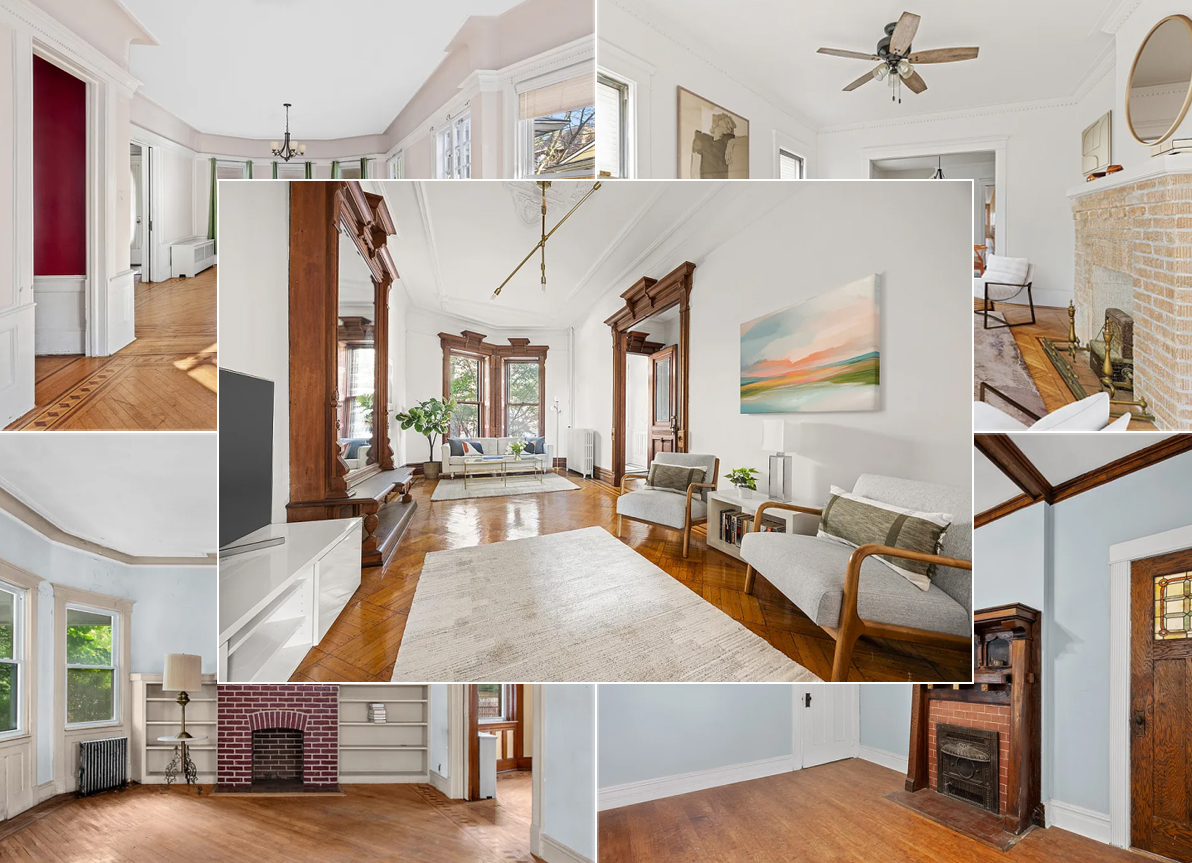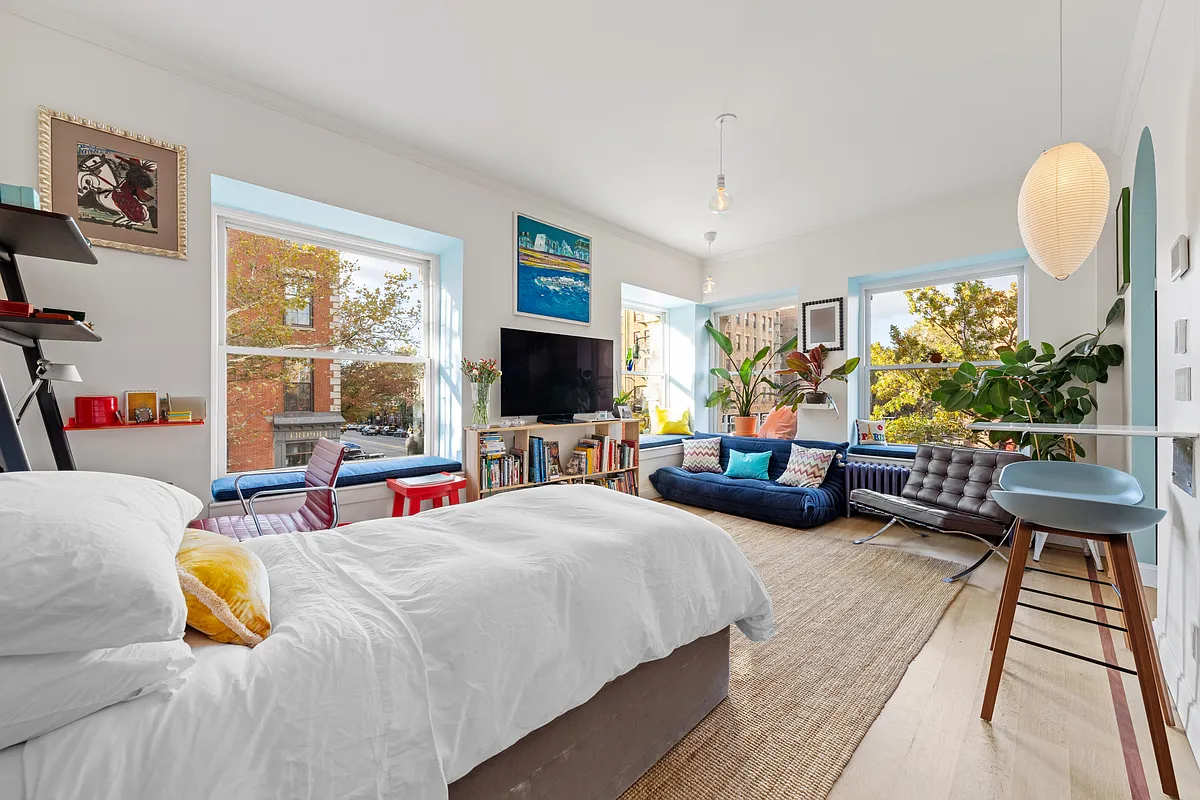Nothing Fuzzy About Affordable Conversion
Lower-income earners who’ve never bought a home before will get an unusual shot at living in an historic building. According to the Brooklyn Downtown Star, an 1890’s police building at Humboldt and Herbert in Greenpoint is slated to be turned into 14 condo units subsidized by $1 million allocation from the North Brooklyn Development Corporation…

 Lower-income earners who’ve never bought a home before will get an unusual shot at living in an historic building. According to the Brooklyn Downtown Star, an 1890’s police building at Humboldt and Herbert in Greenpoint is slated to be turned into 14 condo units subsidized by $1 million allocation from the North Brooklyn Development Corporation and another $300,000 from the borough itself (how does that work?). As someone who has been admiring this building for the past several years, all we can say is that this is a huge score for the lucky few who win the lottery. One drawback: Because of the subsidies, owners will not be able to benefit from any price appreciation that may occur over time.
Lower-income earners who’ve never bought a home before will get an unusual shot at living in an historic building. According to the Brooklyn Downtown Star, an 1890’s police building at Humboldt and Herbert in Greenpoint is slated to be turned into 14 condo units subsidized by $1 million allocation from the North Brooklyn Development Corporation and another $300,000 from the borough itself (how does that work?). As someone who has been admiring this building for the past several years, all we can say is that this is a huge score for the lucky few who win the lottery. One drawback: Because of the subsidies, owners will not be able to benefit from any price appreciation that may occur over time.
Seminar Preludes Affordable Housing [Brooklyn Downtown Star]





You didn’t suggest that people will leave, you imply they should be made to leave. That’s the difference.
Of course there will always be poor people and someone to qualify for these apartments. SO you build in ground rules- but not ground rules that undercut what you want to do. And you increase the affordable housing stock. In NYC today there are far more luxury apartments going up than affordable. Don’t forget, many of these developers get tax breaks and other funding from the city and state (Remember Ratner). I’m angrier about how my money is being spent to help build luxury housing- because that’s where the real money and effort is going. That’s where change has to happen- we’re not helping poor families by giving them a tricked out version of a rental, because that’s all it is- a rental.
there is not enough land, property or money in NYC for this overhaul of corporations coming together to rehab buildings and all that. that sounds real neat, but its unrealistic where are you getting this stuff from? you’re saying that my “revolving door” suggestion is worse than you taking over buildings with what I presume is a money fountain and putting all the poor people in nice homes where they’ll build equity and live happily ever after. honestly, I’d like to see that happen, I’d love nothing more than for poor people to get a break like that but even if you were given the benefit of the doubt and I’d assume that someone would be willing to do all of this… where is the land coming from? there’s barely enough room for the people we have here now. I’m sure land and property will appear from no where to allow the poor to own condos. sign me up!
“Those who are foreclosed will leave and that condo will open up for another.” but when I suggest that people will leave after 25 years and that property will open up for another, that’s elitist.
I don’t really follow what you’re challenging here. no one is saying that the financial situation in a neighborhood will stay the same forever but there will always be poor people so I’m sure there’ll always be someone to qualify for these apartments even after the yuppies have come and gone.
And who is going to decide who has “made it for themselves” or not? No one is saying too bad for the unlucky who didn’t win the lottery. We have to do better than that- we should be building more housing like this with real ownership benefits.You simply can’t think of these condos as a revolving door project. You give it every opportunity to be successful so that you can add to it. Until we as a society understand that all of us are in this together, there will always be limited resources available. But it won’t work if we make it harder for the most vulnerable to make it.
Habitat for Humanity is a great program- I would love to see more of that going on. It serves everyone better.
“Those who are foreclosed will leave and that condo will open up for another.” but when I suggest that people will leave after 25 years and that property will open up for another, that’s elitist.
I don’t really follow what you’re challenging here. no one is saying that the financial situation in a neighborhood will stay the same forever but there will always be poor people so I’m sure there’ll always be someone to qualify for these apartments even after the yuppies have come and gone.
It is about semantics and but it’s also about expectations. You’ve been calling the project subsidized housing and it is not. It is an incentive to allow families that might not otherwise be able to afford to own.And the idea behind that is to create homeowners who will take an active interest in maintaining their property and in their community. You can’t help 20 people “forever” with one property. You need to build more of them. And the only way to get more built is to show that this program was successful. So it makes no sense to start out by insuring it won’t be successful. These projects are just a glorified rental. And that negates the basic premise of giving people a means and incentive to invest in their property and their community.
The other thing you don’t mention is that these are working class people. They have jobs and that means they pay taxes. Maybe not as much as you might- but that isn’t the point. And yes- s**t happens. There will be some foreclosures, I’m sure. You make your own luck – but only up to a point. Those who are foreclosed will leave and that condo will open up for another. THere’s no reason they can’t put in rules that will protect the condos from flippers and from selling to just anyone. But to expect that the neighborhood and financial situations will stay the same over 25 years is unrealistic.
So yes, it is the semantics and the expectations semantics promote. In this case it’s more the Emperor’s new clothes than a Cinderella story.
okay, so after you’ve inevitably run out of buildings, because there’s just not enough space here to help everyone, then what? what happens to those who weren’t “lucky”? do they not deserve help? better yet, regardless of whether they deserve it or not basically you’re suggesting that if they weren’t “lucky” then too bad for them. maybe I’m interpreting what you’re saying incorrectly. if so, I stand corrected, please clarify what they should do? if not, what’s the difference between it being too bad for the people who were locked out all of the good housing programs because there just isn’t enough space and money for everyone and too bad for those who got it for a specified amout of time, didn’t make it happen for themselves, and are now back at square one?
SBB – your post of 10:28. Exactly. I can agree with you 100% on that. The original program is not homeownership, and calling it that calls for some definitions that this program is not providing.
But if you look at any program at any time, or even at the marketplace at large, there is always a finite number of houses, apts, spaces available. If a program (and I’m not saying this is the right program, because I don’t think it is) helps 20 people to get in, that’s all they got anyway. Whether they stay 2 years or 22 years, those spaces are not available for anyone else today, March 30, 2006. So you can only help 20 right now. They are the “lucky” ones.
What’s needed is for the city to work with the private sector to renovate the thousands of abandoned and derelict existant buildings all over the city, not just one or two, and having much fanfare over 1 building, like it makes a dent. Offer these homes and apts at a decent price, and make down payment loans available. Sure, you have to have some conditions and criteria. I understand the need for that. But that allows people to get on the playing field.
MOST people want a home to live in and raise their families. Most people are not interested in playing real estate mogul. I would bet that the majority of people who own their homes who read this blog are not overly interested in selling anytime soon. We may be all interested in knowing what our homes are worth, and we voyeuristically look at everyone elses’ homes, but most aren’t going anywhere. It’s too hard, too traumatic and too stressful to family life. People have roots in their communities, they have friends, schools, houses of worship, etc. Most people are not planning to cash out at the drop of a hat in the rest of the market, and I don’t think most people in a first time homeowner program will either.
Let’s help the 20, then find more opportunities to help the next 20, and the next. What else can a program do?